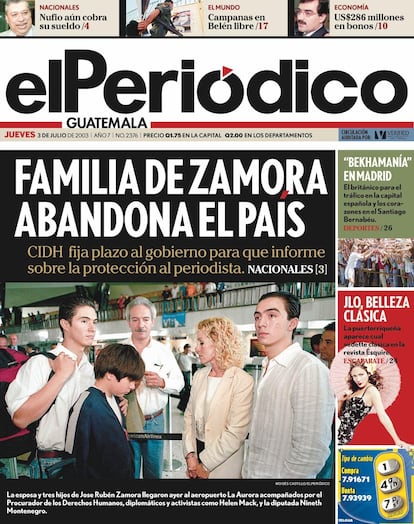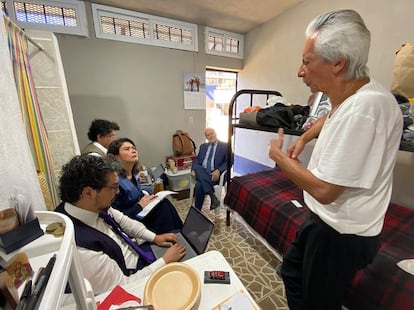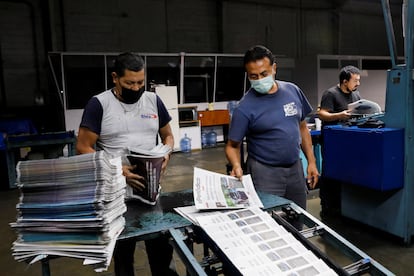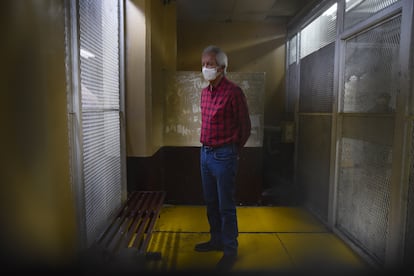José Rubén Zamora, the fourth estate imprisoned in Guatemala: ‘I won’t give up’
EL PAÍS entered the Mariscal Zavala military prison where the journalist has been jailed for the last 18 months. The international community hopes he will be released under the Bernardo Arévalo administration, but he remains calm: ‘I’m ready to spend three months or 100 years here’


To visit José Rubén Zamora, you have to go through three military checkpoints and then follow a path through the forest as soldiers watch you closely from their sentry boxes. You then get an ink stamp on your arm to get through one more fence surrounding the prison cell where the prominent Guatemalan journalist and newspaper publisher has been jailed for the past 570 days.
Guarded by six to eight corrections officers outside a small room with a bunk bed, table, chairs, books, family photos and a bathroom, the journalist who embodies Guatemala’s fourth estate greets us with a resolute message. “I won’t give up. I’m at peace, ready to spend three months or 100 years here.” Now 67 years old, Zamora talks to us for over three hours in his cell at the Mariscal Zavala military prison, which houses everyone from drug traffickers to businessmen and politicians accused of corruption in high-profile cases.
Zamora was the founder of elPeriódico, a newspaper that was forced to close in May 2023 after he was arrested on money laundering charges that he vehemently denies. International organizations have roundly denounced the “serious fair violations” in a case widely viewed as an attack on freedom of the press. The arrest came after the paper’s spotlight on alleged cases of corruption by former president Alejandro Giammattei’s government. Guatemala’s new president, Bernardo Arévalo, has also called it “political persecution of the press.”
Although Zamora was sentenced to six years, an appeals court overturned the conviction last October, and ordered a new trial. Despite alleged torture during his first 17 months in prison, Zamora looks remarkably resilient. “I told myself that I won’t let myself give up,” he said. Anyhow, he jokes, “I’m in charge now,” noting the significant improvement in his living conditions following Arévalo’s inauguration.
For the past three weeks, Zamora, with tanned skin, white hair neatly combed, and a thick mustache, no longer has to spend 23 hours a day isolated in a dark, dusty cell. Solitary confinement caused eye problems for Zamora, who lost 37 pounds (17 kilos) and suffered insect bites that left marks on his skin. “I sprayed Baygon [insecticide] on them, but they sipped it like a Negroni [cocktail] — it made them even hungrier,” he laughs. But the toxic insecticide caused him to break out in hives. His long confinement led to decreased myelin in his nervous system, which then led to neurological problems. This six-foot-tall man, weighing only 140 pounds, finds even the weight of a blanket on his body painful.

Zamora no longer faces the constant threats and middle-of-the-night searches that disrupted his sleep. Cameras no longer record his every move. New prison officials improved his living conditions by adding windows, lights and hot water. They also allow more visitors, and Zamora can now freely move between his cell and a small outdoor exercise area. That’s where he jogs for an hour every day, daydreaming about the five-mile route he used to run along Avenida Las Américas in Guatemala City.
In early February, President Arévalo called the case against Zamora “spurious,” and said it was trumped up to punish him for his newspaper’s critical reports. Arévalo firmly believes in the separation of powers in government, and wants Zamora’s case to follow due process in a legal system that the president himself distrusts. Since taking office, however, the new administration has significantly improved Zamora’s prison conditions.
The new government has also opened up the prison to domestic and international scrutiny. Zamora recently met with Guatemala’s new Interior Minister, leaders of the ruling Semilla party in Congress, the head of Guatemala’s prison system, European and American diplomats, as well as the Inter-American Commission on Human Rights (IACHR). The former government repeatedly refused requests to visit Zamora in prison.

After this procession of visits from influential people, the guards “are now asking me for favors... But I don’t know this government,” said Zamora. He also says prison officials offered to move him to a “VIP cell” in another military prison where politicians, drug traffickers and businessmen live in the same comfort they had on the outside. Zamora rejected the offer because “It just didn’t seem ethical to me — I had criticized those privileges myself.”
The high price of challenging power
An industrial engineer by profession, José Rubén Zamora emerged as one of the most critical voices in Guatemalan journalism after working for several oil and cement companies in the 1980s. He soon ventured into journalism, well before Guatemala’s long civil war (1960-1996) ended. In 1990, he founded his first newspaper, Siglo Veintiuno, but left in 1996 and launched elPeriódico. “I believed I could create a compelling, influential newspaper that serves as a catalyst for change, interpreting our nation and reshaping norms. In a country dominated by factions, our elites have favored oligopolies, monopolies and political corporatism over democracy, freedom and transparency,” he tells us. Juan Pablo, a lifelong employee of the Zamora family has just cleaned the cell. Since Zamora’s wife had to leave the country nine months ago, Juan Pablo brings food to the prison every Tuesday and Saturday. That day, the young man took some of Zamora’s suits to the dry cleaners for his upcoming hearing on February 21.
Zamora’s publications employed hundreds of journalists and chronicled the contemporary history of Guatemala. His extensive network of sources was eager to expose the wrongdoings they saw in politics and business. Politicians, entertainers, police officers, judges and diplomats all shared information that his team diligently verified for publication in Zamora’s El Peladero column. His investigative reporting garnered both domestic respect and international recognition. Zamora received the Maria Moors Cabot award from Columbia University, and was one of the 50 World Press Freedom Heroes recognized in 2000 by the Vienna-based International Press Institute for significant contributions to press freedom and freedom of expression.
But challenging power can come at a high price. Throughout its 30-year existence, elPeriódico faced numerous lawsuits. Zamora personally experienced attacks, threats, kidnappings and even a murder attempt. “I used to joke with my dentist that someday he’d have to identify me by my teeth,” said Zamora. This is not far-fetched. In 2008, he was kidnapped and beaten until unconscious. “They broke a [spinal] disc into three pieces. I was in hospital for six months with a bacterial infection.”

Zamora and part of his family moved to the United States after an attack on their home in 2003. The kidnappers tricked his wife and three children into thinking they had murdered the journalist. But Zamora returned to Guatemala soon after. Nothing could stop him from pursuing his uncomfortable brand of investigative journalism, and he was invited to give talks around the world.
He jokes about the constant financial challenges the newspaper faced, saying that he espoused “financial theology — how to bring about eight miracles to meet the payroll.” Following his reports of corruption involving powerful figures, advertisers withdrew under government pressure. “[Former president] Otto Pérez Molina took 40 million quetzales [$5.1 million] in advertising from me by threatening four telephone companies, a cement company, a brewery...” Meanwhile, Zamora liquidated some his own assets to keep the newspaper afloat.
Zamora’s defense lawyers prosecuted
In 2018, Zamora received a call from the Ministry of Justice. Controversial Attorney General Consuelo Porras (sanctioned by the U.S. for blocking anti-corruption investigations) wanted to see him. “She called me into her office once a month after that.” Porras openly clashed with Juan Francisco Sandoval, the ministry’s special prosecutor against impunity (FECI). Sandoval was investigating alleged cases of corruption in the Giammattei administration and was close to Zamora. “She didn’t want Sandoval around. She wanted to kick him out of the ministry to neutralize both him and me.”
The meetings between Zamora and Porras went on until mid-2021, when elPeriódico published its investigation of the “Russia scheme.” The newspaper revealed that a group of Russian businessmen were seeking a mining concession in exchange for bribes. Zamora handed his evidence over to Sandoval. The story contained intriguing details such as a rug stuffed with cash given to Giammattei for his campaign. This revelation led to Sandoval’s exile and marked the end of Zamora’s meetings with Porras. “She called me to the ministry one last time, very angry,” he said. On that occasion, instead of meeting in her office, Porras sat him at a “long and messy” table. She launched into a three-hour harangue laced with threats, never making eye contact. “She told me that she was taught as a child to never let anyone defeat or embarrass her.” EL PAÍS reached out to the attorney general’s office to verify this account, but has not received a response as of the publication of this report.
Soon after, a Ministry of Justice source warned Zamora they were seeking incriminating evidence against him. Then, the “constant persecution” began. The government seized elPeriódico’s bank accounts and Zamora’s personal accounts. In July 2022, 18 officers wearing balaclavas and carrying rifles broke down the door to his home and arrested him. elPeriódico’s offices were raided later that day. Zamora wasn’t informed of the charges until the initial hearing and wasn’t allowed to communicate with his lawyers, who were given no information about the charges and evidence.

The charges that were ultimately revealed were based on testimony from a former banker who had once been a source for Zamora. He accused Zamora of forcing him to launder 300,000 quetzales ($38,000), money the journalist admits having from selling a painting gifted by a Guatemalan artist friend named Elmar Rojas to finance his newspaper.
A recent report by TrialWatch (part of the Clooney Foundation for Justice) found “numerous breaches of international and regional fair trial standards.” Zamora had to engage 10 defense attorneys, and four of them eventually faced criminal charges of their own. “It’s one of the most absurd legal processes I’ve ever seen,” said Zamora’s former defense lawyer, Juan Francisco Solórzano Foppa. “They never let us present a defense. When we clearly showed where the money came from, they countered by accusing us, labeling us as criminals, and sending us to jail.”
Zamora’s arrest was seen as a warning to other journalists. “José Rubén Zamora was a mentor for Guatemalan journalists and published elPeriódico, one of the three most influential media outlets in the country. All that disappeared after his arrest. This case is not just about the legal outcomes — it’s about the messages sent and symbolic impacts of his arrest,” said Pedro Vaca, the IACHR’s special rapporteur for freedom of expression.
The future
The Zamora family wants to be able to present evidence and witnesses for his defense in the new trial. They also want him to be moved to house arrest during oral arguments, “in accordance with the law.” But Zamora knows all this could take a long time. “I might get house arrest sometime in the next three years. But I’m a realist, and for my own peace of mind, I’m reconciled to staying here,” he said. What he wants most is for his wife to be able to safely return from exile.

While President Arévalo vowed to ensure journalists aren’t imprisoned arbitrarily, Zamora remains cautious about his promises for press freedom. “Arévalo only has control of the executive branch. The judiciary branch continues to be a multiparty ‘narco-klepto dictatorship’ that kept a low profile until it became brazen under Giammattei.”
In a certain sense, Zamora and the president share similar plights. The judge presiding over Zamora’s case —Freddy Orellana — is the same one who launched the persecution of Arévalo’s party. This is why Zamora believes Arévalo should rethink his cautious approach to Attorney General Consuelo Porras, whom the president accused of leading a coup d’état last year to prevent him from taking office. The president should fire Porras immediately, says Zamora. “That woman has committed and continues to commit flagrant crimes. That’s the way the president must look at this or he’s going to end up in my neighborhood.”
Everyone expects Zamora to start another newspaper when he gets out of prison, but his son wants him to consider retiring to a seaside cottage in the United States. But the man who has chronicled Guatemalan history for over 40 years still looks strong enough to wade into battle again. “I think I’m one of God’s favorites. There’s a reason I’m still here. I must have a great many supporters in Heaven,” he said as we leave. “All I want is an official apology from the government, and for Ángel González [a conservative media baron and Zamora foe] to broadcast that apology for three hours during prime time.”
Sign up for our weekly newsletter to get more English-language news coverage from EL PAÍS USA Edition